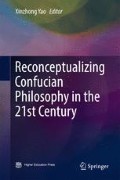Abstract
“Humaneness” is a core category in Confucian philosophy. This article attempts to highlight the subtle connections among a set of concepts that are central to this philosophy, namely “reproduction” 生 (sheng), “familiarity” 親 (qin), “love” 愛 (ai), and “humaneness” 仁 (ren), and thus to investigate how Confucius appropriated “humaneness” as an exclusively Confucian term.
Access this chapter
Tax calculation will be finalised at checkout
Purchases are for personal use only
Notes
- 1.
I want to take this opportunity to express my sincere gratitude to Professor Huang Kejian 黄克剑 for the invaluable guidance and feedback that he gave me in the writing of this paper. He has influenced this papers understanding that ren 仁 in its earliest form had the connotation of “reproduction” and that the term should be comprehended primarily in association with humanity instead of any other things. Furthermore, Professor Huang has suggested a new view on the original meaning of ren in a recent article where he writes that “ren” was originally written with shen 身 (body) and xin 心 (heart) as
 . It means that a person who is conceiving has deep love for another person who is being conceived, but the meaning of “reproduction” is still included in ren 仁. See his article in Wen Dao 问道 (Questioning the Way), issue no. 4, 2010.
. It means that a person who is conceiving has deep love for another person who is being conceived, but the meaning of “reproduction” is still included in ren 仁. See his article in Wen Dao 问道 (Questioning the Way), issue no. 4, 2010. - 2.
I have opted to leave this word untranslated so as to avoid the connotations of a transcendent creator that the standard glosses of “God” and “Supreme Being” carry in English.
- 3.
According to Shang myth, a swallow was commissioned by Heaven to descend to earth and give birth to the first ruler of the dynasty, thus the swallow came to represent the ancestral line of the rulers.
- 4.
See also Chen (2008), particularly the first section entitled “Shengming Chongbai yu ‘Di’ Chongbai” 生命崇拜与“帝”崇拜 (“The Worship of Life and the Worship of Di”).
- 5.
While I have consulted James Legge’s English translation, all translations herein are my own.
- 6.
- 7.
But these sorts of extensions are not limited to ancient people, and Schopenhauer provides a modern version of this. At one point in his The World as Will and Representation, he expanded the “will” that he had derived from humankind to animals, plants, and even organic and inorganic things like waterfalls and iron filings. He called this method “efficient naming.”.
- 8.
For more on this idea pertaining to the “sage,” see Huang (2006).
- 9.
Lunyu 7.6.
References
Chen, H. (2008). “Shengcheng Yishi, Dao, Jiao, Yuyan Zijue—Xian Qin Yuyan Zijue Kaobian” 生成意識•道•教•語言自覺——先秦語言自覺考辨 (Productive consciousness, the way, mind-culturing, and linguistic awareness: an analysis of Pre-Qin linguistic Awareness). In: Huang Kejian ed. Wen Dao 問道 (Questioning the Way). Fuzhou: Fujian Jiaoyu Chubanshe.
Duan, Y. (2001). Shuowen Jiezi Zhu 說文解字注 (Commentary on the analytical dictionary of Chinese characters). Beijing: Quanguo Tushuguan Wenxian Suowei Zhongxin.
Huang, K. (1998). “Zhouyi” Jing, Zhuan yu Ru, Dao, Yinyangjia Xueyuan Tanyao《周易》經、傳與儒、道、陰陽家學緣探要 (A General probe into the intellectual relationship between the book of changes and Confucianism, Daoism, and Yinyangism). In: Huang Kejian Zixuan Ji 黃克劍自選集 (The self-selected anthology of Huang Kejian). Guilin: Guangxi Shifan Daxue Chubanshe.
Huang, K. (2006). You “Ming” Er “Dao” —Xian Qin Zhuzi Shi Jiang 由“命”而“道”——先秦諸子十講 (From “Fate” to “Dao”—Ten Studies of Pre-Qin Philosophers).Beijing: Xianzhuang Shuju.
Huang, Q. (2006). “Zhouyi shiguan chutan” 周易時觀初探 (“Preliminarily ideas on Time in the Yijing”). In: Zhouyi Zongheng Tan 周易縱橫談 (Free Talks on the Yijing). Guilin: Guangxi Shifan Daxue Chubanshe.
Huang, K. (2008). “‘Bei’ Cong He Lai? —Jiu Beiju zhi ‘Bei’ dui Zhongxi Wenxue Renwen Quxiang de Yige Bijiao” “ 悲”從何來?——就悲劇之“悲”對中、西文學人文趣向的一個比較 (In what sense is a tragedy “tragic”—A comparison between the humanistic significances of Chinese and Western literary concerning the essence of tragedy). In: Wen Dao 問道 (Questioning the Way). Fuzhou: Fujian Jiaoyu Chubanshe.
Zhou, Dunyi. (2000). Zhou Zi Tongshu 周子通書 (The book of Zhou Dunyi). Shanghai: Shanghai Guji Chubanshe.
Author information
Authors and Affiliations
Corresponding author
Editor information
Editors and Affiliations
Rights and permissions
Copyright information
© 2017 Springer Nature Singapore Pte Ltd. and Higher Education Press
About this chapter
Cite this chapter
Chen, H. (2017). Reproduction, Familiarity, Love, and Humaneness: How Did Confucius Reveal “Humaneness”?. In: Yao, X. (eds) Reconceptualizing Confucian Philosophy in the 21st Century. Springer, Singapore. https://doi.org/10.1007/978-981-10-4000-9_3
Download citation
DOI: https://doi.org/10.1007/978-981-10-4000-9_3
Published:
Publisher Name: Springer, Singapore
Print ISBN: 978-981-10-3998-0
Online ISBN: 978-981-10-4000-9
eBook Packages: Religion and PhilosophyPhilosophy and Religion (R0)


 . It means that a person who is conceiving has deep love for another person who is being conceived, but the meaning of “reproduction” is still included in ren 仁. See his article in Wen Dao 问道 (Questioning the Way), issue no. 4, 2010.
. It means that a person who is conceiving has deep love for another person who is being conceived, but the meaning of “reproduction” is still included in ren 仁. See his article in Wen Dao 问道 (Questioning the Way), issue no. 4, 2010.